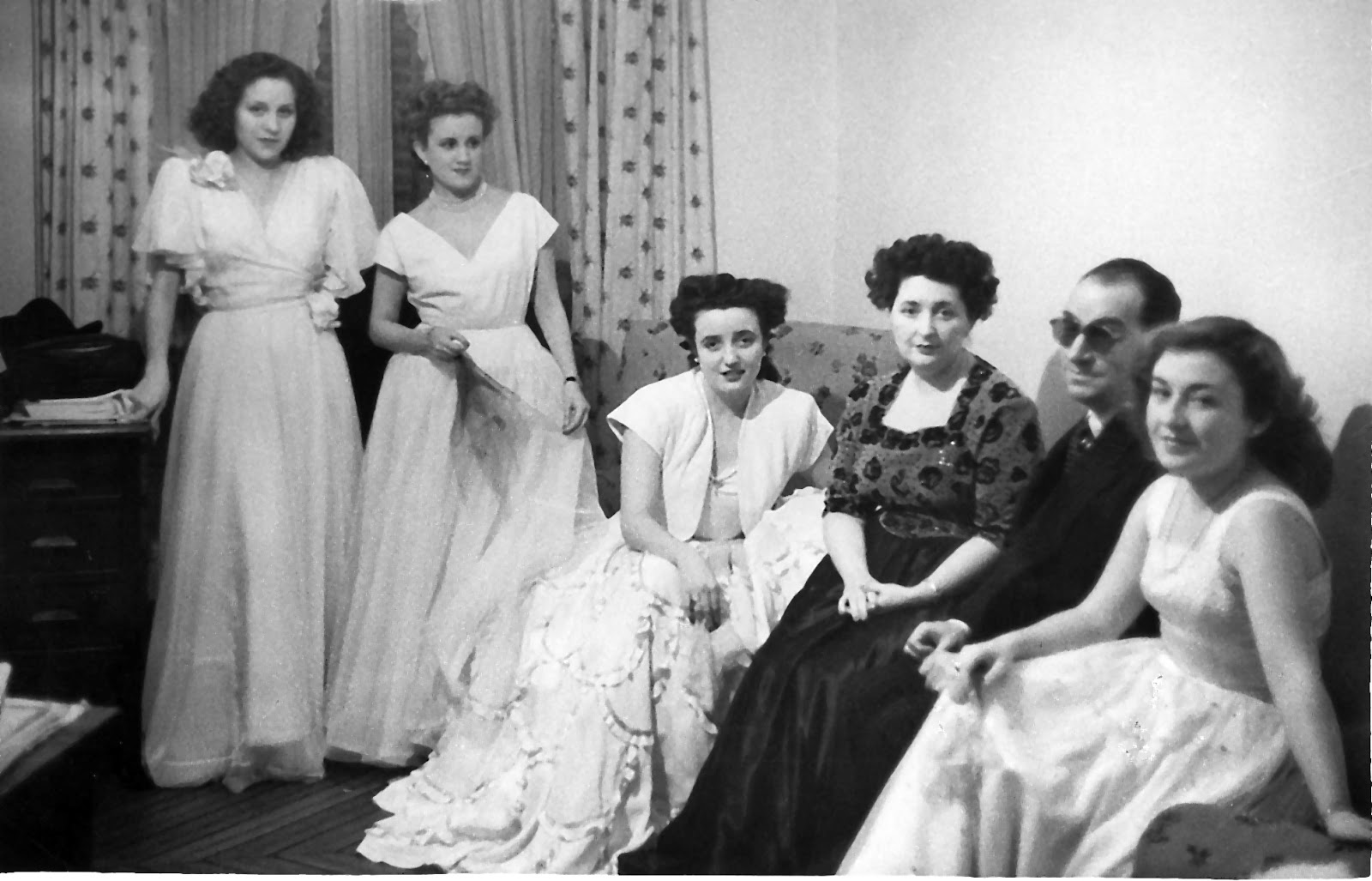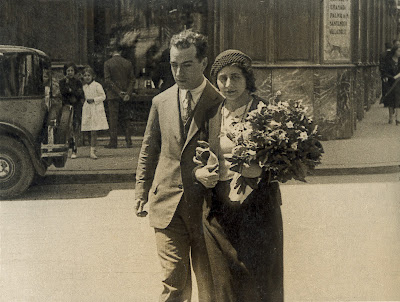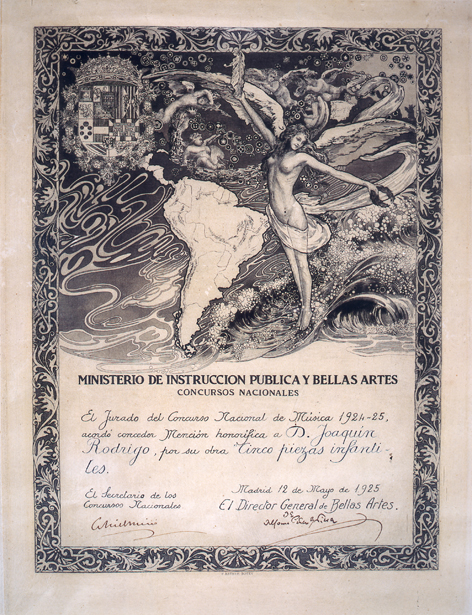In memoriam
Scroll down for English
De dos grandes sopranos españolas, intérpretes de Joaquín Rodrigo: Maria Ángeles Morales (1929-2013) y Carmen Pérez Durías (1926-2013)
De dos grandes sopranos españolas, intérpretes de Joaquín Rodrigo: Maria Ángeles Morales (1929-2013) y Carmen Pérez Durías (1926-2013)
En
un corto intervalo de tiempo nos han dejado Carmen Pérez Durías (21 de abril) y
María Ángeles Morales (28 de mayo).
Con
tristeza, y en su recuerdo, me
animo a escribir unas líneas, pues sus grandes carreras están ligadas por
encima de todo a mi padre pero, en cierto modo también, a mi niñez.
Mª
Ángeles y Carmen coinciden en que ambas fueron alumnas de mi madrina y gran
maestra de canto Lola Rodriguez de Aragón, y en que ambas fueron protagonistas
junto a otros grandes artistas del momento de los estrenos que yo calificaría
de históricos, de dos de las más importantes obras para voz de mi padre:
Cuatro
madrigales amatorios
 |
De izqiuerda a derecha: María Ángeles Morales, Carmen Pérez Durías, Blanca María Seoane, Lola Rodriguez Aragón, Joaquín Rodrigo y Celia Langa.
4
de febrero de 1948 en el Ateneo de Madrid, actuando al piano el propio
autor. A María Ángeles le
correspondió "De dónde venís
amore", y a Carmen "De los álamos vengo, madre" y "Ausencias de Dulcinea"
 |
| De izquierda a derecha: Clara María Alcalá, Dolores Ripolles, Eduardo Toldrá, Joaquín Rodrigo, Blanca María Seoane, Carmen Pérez Durías y Chano Gonzalo |
En
abril de ese mismo año, con la Orquesta Nacional de España bajo la dirección de Eduardo Toldrá, y
con la actuación como solistas de Carmen Pérez Durías, Blanca Maria Seoane,
junto a Clara María Alcalá y Dolores Ripollés, y el bajo Chano Gonzalo.
Aunque no tuve ocasión de
relacionarme mucho con María Ángeles pues yo era por aquel entonces una niña,
la recuerdo como una mujer guapísima, que triunfó internacionalmente como
cantante y como actriz protagonista en varias películas. Ví Teatro Apolo. Su carrera fue muy
brillante, pero también fugaz.
Carmen
Perez Durías, gran artista y persona maravillosa, estuvo muy ligada a mis
padres, y a lo largo de muchos años hemos mantenido una estrecha amistad entre las familias. Además de las obras
anteriores, fue protagonista del estreno mundial de la canción, con letra de
Rosalía de Castro "Un home, San Antonio". Pero todavía hay más:
Actuó en numerosos recitales y conferencias-conciertos
recorriendo la geografía española junto a Joaquín Rodrigo en los años 48-49-50.
Todo
lo anterior, es histórico, pero nunca olvidaré cuando, años más tarde, pasamos
ratos estupendos preparando juntas funciones teatro-musicales para niños. Sé
que me quería mucho, como yo a ella. Además yo la admiraba y aprendí mucho de
ella. Tenía un carácter jovial, era simpatiquísima y culta.
Para
apoyar mi modesto homenaje y recuerdos, me parce oportuno ilustrar este escrito
con programas y críticas de aquellos años. Forman parte de nuestro riquísimo
archivo, unos de los más importantes de España. Deseo llamar la atención a
todos los músicos y en particular a los cantantes del mundo entero sobre los
documentos que pongo hoy a su disposición, por su carácter histórico. Somos
dados a olvidar en nuestro país, ignorando algo tan obvio como que construimos
nuestro presente sobre la base del trabajo y del arte que, a través del tiempo
otros personajes nos dejaron. Me
siento feliz recordando y admirando, cuanto más tiempo pasa, a nuestras grandes
y a veces olvidadas figuras del pasado.
En
lo que se refiere a Joaquín Rodrigo, hay hasta quien ignora que era ciego, o
cómo era su proceso compositivo y... observando las obras que componen el
programa que comento: El compositor no solo acompañaba sus propias obras al piano
a la insigne cantante -que me temo la mayoría no recuerde- sino que además,
precedidos de amenas palabras de orientación sobre obras y autores, acompañaba lieds de la escuela italiana entre los
S.XVI y XIX y lieds del periodo
romántico alemán. Todo el programa sin leer partitura alguna .... pues era
ciego.
Descansen
en paz Mº Angeles Morales y Carmen Pérez Durías.
Críticas
que aparecieron en periódicos asturianos como en "El Comercio",
Gijón, 2 marzo 1948.
 ...¿Con
qué la lavaré? y De los alamos vengo. La señorita Pérez Durías dió a estos delicadísimos madrigales colorido, expresión, gracia y
carácter. En el último, algo que
quedará como cosa verdaderamente saliente en la ya muy varia e interesantísima
producción de Rodrigo, Carmen Pérez Durías imprimió su sello propio a esta obra
final que precisamente le está dedicada.
...¿Con
qué la lavaré? y De los alamos vengo. La señorita Pérez Durías dió a estos delicadísimos madrigales colorido, expresión, gracia y
carácter. En el último, algo que
quedará como cosa verdaderamente saliente en la ya muy varia e interesantísima
producción de Rodrigo, Carmen Pérez Durías imprimió su sello propio a esta obra
final que precisamente le está dedicada.
El
público, entre aplausos cariñosísimos, obligó a bisarla y aún después de
escucharla por segunda vez se repitieron los aplausos que obligaron al gran músico ciego y a la gentil
cantante a salir varias veces a escena para contestar a tan cordial
despedida.
"La
Régión", 2 marzo 1948
La
música de Joaquín Rodrigo y el arte de Carmen Pérez Durías
Joaquín
Rodrigo y Carmen Pérez Durías son una pareja ideal para esta clase de
conciertos de música íntima. La
bellísima voz de Carmen se adapta al espíritu de Joaquín, y la música de
Joaquín parece acariciar la voz de Carmen: es una compenetración perfecta de arte musical.
 Dos
partes del programa sostuvo la encantadora soprano cuya voz de oro embelesó al
numeroso público que la escuchaba. La primera, cuatro obras de la escuela
clásica italiana, cuyas características nos anunció antes la palabra amena de
Rodrigo, y otras cuatro alemanas de la época romántica. Todas parecían nuevas creaciones de Carmen
Pérez Durías. Todas conocidas,
incluidas en el repertorio escogido de las grandes "liederistas", tuvieron en esta gentil cantante una expresividad
deliciosa que llega fácilmente al alma del oyente, y Rodrigo dando el
predominio al canto de los clásicos italianos y adquiriendo en cambio en el lied alemán la personalidad pianística
que el romanticismo exige, acompañó con una delicada y justísima comprensión...
Dos
partes del programa sostuvo la encantadora soprano cuya voz de oro embelesó al
numeroso público que la escuchaba. La primera, cuatro obras de la escuela
clásica italiana, cuyas características nos anunció antes la palabra amena de
Rodrigo, y otras cuatro alemanas de la época romántica. Todas parecían nuevas creaciones de Carmen
Pérez Durías. Todas conocidas,
incluidas en el repertorio escogido de las grandes "liederistas", tuvieron en esta gentil cantante una expresividad
deliciosa que llega fácilmente al alma del oyente, y Rodrigo dando el
predominio al canto de los clásicos italianos y adquiriendo en cambio en el lied alemán la personalidad pianística
que el romanticismo exige, acompañó con una delicada y justísima comprensión...
En
la tercera parte volvió Carmen a cantar las inspiraciones de Rodrigo...y esos
Madrigales que tiene arraigados en su corazón y que se deleita haciéndonos oír
en las armonías de su voz maravillosamente timbrada...
In
memoriam (translation)
Two
great Spanish sopranos, performers of Joaquín Rodrigo’s Works: María Ángeles
Morales (1929-2013), Carmen Pérez Durías (1926-2013)
In
a short interval of time, we have lost Carmen Pérez Durías (April 21st) and
María Ángeles Morales (May 28th).
In their memory, and with a sad heart, I would like to write a few lines
as their great careers were linked closely to my father, and, in a certain way,
to my childhood.
Maria
Ángeles and Carmen coincided in
having been pupils of my godmother, the great voice teacher, Lola
Rodríguez de Aragón, and both had protagonist roles, together with other great
artists of the moment, in the premieres, which I would qualify as historic, of
two of my father’s most important vocal works:
Cuatro madrigales amatorios
 |
| from left to right: María Ángeles Morales, Carmen Pérez Durías, Blanca María Seoane, Lola Rodriguez Aragón, Joaquín Rodrigo y Celia Langa. |
(February
4, 1948, at the Ateneo of Madrid, with piano accompaniment by the
composer). “De dónde venís amore”
corresponded to Maria Ángeles and
“De los álamos vengo, madre” to Carmen.
And
in April of the same year, the National
Orchestra of Spain, conducted by Eduardo Toldrá premiered
Ausencias de Dulcinea,
 |
| from left to right: Clara María Alcalá, Dolores Ripolles, Eduardo Toldrá, Joaquín Rodrigo, Blanca María Seoane, Carmen Pérez Durías y Chano Gonzalo |
with
two of the same sopranos, Carmen Pérez Durías, Blanca María Seoane, with Clara
María Alcalá and Dolores Ripollés, together with the bass Chano Gonzalo.
Although
I didn’t have much contact with María Ángeles, as I was a child at the time, I
remember her as a beautiful woman, who had international success both as a singer
and an actress, starring in various films. I saw her in Teatro
Apolo. Her career was
brilliant, but also brief.
Carmen
Pérez Durías, a great artist and marvellous person, had close ties to my
parents, and over many years our two families maintained a sincere
friendship. In addition to the
works previously mentioned, she was responsible for the world premiere of the
song, set to a poem by Rosalía de Castro, “Un home, San Antonio”. And going
even further: she performed numerous recitals and conference/concerts touring
all of Spain together with Joaquín Rodrigo in the years 1948, ‘49 and ‘50.
All
the above is history, but I will never forget, years later, the wonderful time
I spent with her preparing musical and theatrical productions for children. I know she was very fond of me, as I
was of her. I also admired her
greatly and learned very much from her.
She was jovial, extremely likable and very cultivated.
To
illustrate my modest tribute and recollections, I thought it would be
interesting to include programs and reviews from the period. These belong to
our Foundation’s archive, one of the most extensive in Spain. I would like to call the attention of
all musicians and particularly singers from around the world, to the historic
character of the documents I am
making public. In this country we
are inclined to forget, and ignore something as obvious as the fact that we
construct the present on the basis of the work and the art that other figures
have bequeathed to us over the years. As time goes by, I find much pleasure in
remembering and admiring great figures from the past, who are often practically
unknown...As far as Joaquín Rodrigo is concerned, even today some people do not
know he was blind, or what
procedure he used to compose and...take a look at the contents of the
program I include here. The
composer not only provided the distinguished singer with piano accompaniment for his own works ...which I fear
the majority of people do not recall...but in addition, following his own
entertaining words of introduction to the works and composers on the program,
he accompanied 16th to 18th century lieds
of the Italian school, and lieds from
the German Romantic period as well.
The entire program without a single score...since he was blind.
Rest
in peace Maria Ángeles Morales and Carmen Pérez Durías.
May
these figures of Spanish music who have contributed to enhance our history rest
in peace. The best homage we can
pay them is to remember them
always and be thankful for their legacy.
See
the following reviews which appeared in newspapers of Asturias:
The
concert by the Philharmonic caused a very pleasant impression. The illustrious
composer Joaquín Rodrigo offered us a magnificent display of many of his works
and together with the great blind composer we had the chance to enjoy the
remarkable soprano Carmen Pérez Durías.
 ...”¿Con
qué la lavaré?” and “De los álamos vengo, madre”. Miss Pérez Durías gave these very delicate madrigals color,
expression, grace and character. For the last one, and this will remain as
something quite outstanding in Rodrigo’s
already varied and interesting production, Carmen Pérez Durías gave her
own personal touch to the final work which is, in fact, dedicated to her.
...”¿Con
qué la lavaré?” and “De los álamos vengo, madre”. Miss Pérez Durías gave these very delicate madrigals color,
expression, grace and character. For the last one, and this will remain as
something quite outstanding in Rodrigo’s
already varied and interesting production, Carmen Pérez Durías gave her
own personal touch to the final work which is, in fact, dedicated to her.
The audience applauded enthusiastically and called
her back for an encore, after which the applause was so prolonged the great
blind composer and the gracious singer had to take several more bows to
acknowledge such a cordial farewell.
The
music of Joaquín Rodrigo and the art of Carmen Pérez Durías
Joaquín
Rodrigo and Carmen Pérez Durías are the ideal pair for this type of concert of
intimate music. The stunningly
beautiful voice of Carmen adapts to the spirit of Joaquín, and the music of
Joaquín seems to caress the voice of Carmen: perfect chemistry for the art of
music.
Two
parts of the program were sustained by the delightful soprano whose golden
voice charmed the audience. The first part consisted of four works from the
classical Italian school, whose characteristics were described in Rodrigo’s
pleasant talk, and four more German works from the Romantic period. They all appeared to be newly created
by Carmen Pérez Durías. All of
them were familiar as they are included in the repertoire chosen by great “liederists”, but the gracious singer endowed them with a delicate
expressivity that goes straight to the listener’s soul, and Rodrigo, giving
preference to the voice of the Italian classics, and later taking on the pianistic
personality that Romanticisim requires for the German lied, provided accompaniment that was delicate and of precise
comprehension.
In
the third part Carmen returned to sing the inspirations of Rodrigo...and those
Madrigals which she carries in her heart and delights in performing for us with the harmonies of her
marvellously pitched voice...
Cecilia Rodrigo Camhi
Daughter of Joaquin Rodrigo
President of the Victoria and Joaquín Rodrigo Foundation












Comentarios
Publicar un comentario